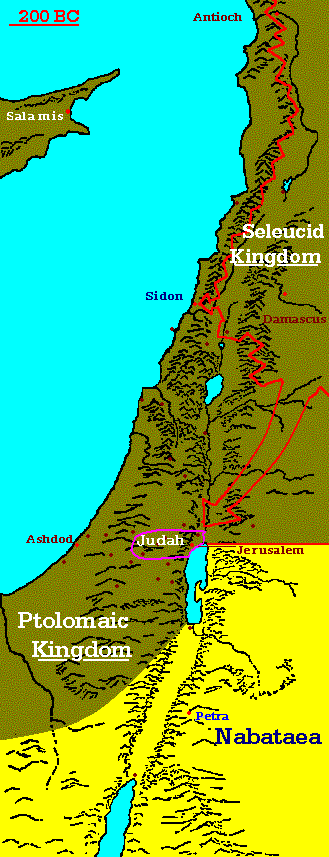Prepare Ye the Way
200 - 100 BC, the Holy Land
200 - 100 BC, the Holy Land
 The quiet time of restoration and growth came to an end when Antiochus III seized the Holy Land in 198 BC and began a deliberate policy of Hellenization.
His son, Antiochus IV Epiphanes, angered at the intransigence of the Jews, sacked Jerusalem in 168 BC, profaning the Temple and ordering an end to Jewish rites and customs.
The quiet time of restoration and growth came to an end when Antiochus III seized the Holy Land in 198 BC and began a deliberate policy of Hellenization.
His son, Antiochus IV Epiphanes, angered at the intransigence of the Jews, sacked Jerusalem in 168 BC, profaning the Temple and ordering an end to Jewish rites and customs.
Revolt broke out among the enraged Jews. Begun by the priest Matthias, it was carried on by his sons against seemingly impossible odds. Judas the Maccabee (after whom the dynasty is named) liberated Jerusalem and the Temple was rededicated in a festival still celebrated as Hannukah. There followed innumerable battles and diplomatic skirmishes. When Judas was killed, his brother Jonathon succeeded as leader, and after him, his brother Simon. Simon's son John Hyrcanus succeeded to the leadership in 134 BC as king and high priest of an independent Jewish state.
The scepter of the evils of temporal monarchy rose again. Under John Hyrcanus, Judea began a territorial expansion over Idumaea or Eod (which was forcibly converted to Judaism), Samaria, Galilee, and the Transjordan. He was succeeded by this two sons, aristotulus, then Alexander Jannaeus.
Posted by John  Read more
Read more  Comments (15)
Comments (15) ![]() 17.01.
17.01.